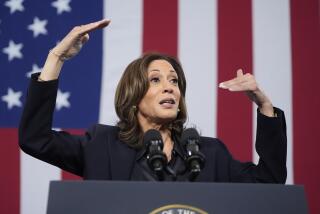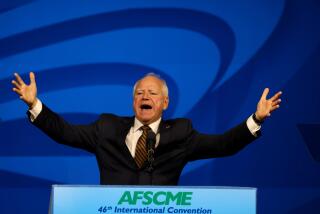Organized labor took big hits in California and Wisconsin elections
Election results in California and Wisconsin this week are being viewed as a turning point for organized labor — to its detriment.
Voters in San Jose and San Diego on Tuesday overwhelmingly approved measures that curtail public employee pension programs, and Wisconsin voters rejected a recall of Gov. Scott Walker, a Republican who has taken on the public employee unions in that state.
Analysts say the decisions were influenced by a weak economy, in which Americans who have suffered losses of income or benefits are loath to see tax dollars spent to provide good pay and pensions for public workers. The defeats in Wisconsin and California will make it more difficult for unions to resist concessions, they say.
“Not only will it embolden some governors in subtle ways, but it will also make legislators more inclined to question the potency of unions,” said E.J. McMahon, senior fellow at the Manhattan Institute for Policy Research. “If you have enough money, you can beat them in a state like Wisconsin.”
He and others say organized labor will need to adjust its tactics to reflect the new realities, and some point to a June contest in Los Angeles for the leadership of the 1.6-million member American Federation of State, County and Municipal Employees as a key test.
That election pits Lee Saunders, the right-hand man of the group’s current president, who stands for the status quo, against Danny Donohue, a New York labor leader who is pushing for change. Both have selected women from Southern California as running mates.
“It’s a turning point for the union — its going to define their very existence,” said Harley Shaiken, a UC Berkeley professor who specializes in labor issues. “There are some very new challenges out there that are going to require a very innovative union that can move quickly and address challenges in new ways.”
Many in labor agree that something needs to change, although the outlook is not entirely bleak. In November, Ohio voters overturned a state law that had limited collective bargaining by public employees.
The AFL-CIO has focused on bringing nonunion members such as taxi drivers and middle-class workers into its fold. Now, it’s AFSCME’s turn to change, which puts the spotlight on the upcoming election, especially because union leadership elections are rarely contested.
But the struggling economy puts public employee unions in a more difficult position than many other labor groups as governors in even traditional Democratic strongholds ask for concessions to solve budget problems.
“What’s different now isn’t the ballot being used to attack unions, it’s the deep uncertainty and weakness of the economy putting people on edge,” Shaiken said.
Upcoming battles will test just how far the economy will force unions to bend. New Hampshire will probably face a right-to-work measure when its Democratic governor steps down; Iowa is looking to require state workers to pay more on their health insurance premiums; Pennsylvania legislators plan to substitute 401(k)s for defined benefit plans for state employees.
Part of the problem: Unions in general haven’t done a good job getting Americans on their side. A 2011 Pew poll showed just 45% of Americans viewed them favorably.
“There is no doubt that public-sector unions are under attack in this kind of economy,” said Paul Secunda, associate professor of law at Marquette University in Milwaukee. “The question is, can the unions show the public that it’s not about them being overpaid, it’s about large corporate tax breaks that cause deficits to begin with?”
Donohue, one of the candidates in the AFSCME election in Los Angeles, said that changing public perception has much to do with where unions focus their energy. By donating to national elections rather than galvanizing support in states such as Wisconsin, unions have lost crucial support, he said. Exit polls indicate 38% of voters from union households supported Walker in Wisconsin’s recall election.
“Unfortunately, the perception of unions is of guys sitting around in Washington, posturing for the cameras,” said Donohue, who has headed the 200,000-member New York Civil Service Employees Assn. since 1994. “We need a grass-roots union where members have a greater voice.”
He proposes strengthening local unions in battleground states rather than donating to national campaigns. Donohue criticizes a $1-million ad buy by the union in Florida’s GOP primary as an example of how the union misspends its money in national elections.
But Donohue’s part in negotiating concessions with New York Gov. Andrew Cuomo makes Mark Brenner, co-director of grass-roots group Labor Notes, skeptical.
“It’s not a credible argument on his part to say that he’s got a different philosophy about doing politics,” Brenner said.
Saunders is the son of a Cleveland bus driver who would be the first African American head of a major labor union. He’s the group’s secretary-treasurer and before that served as the assistant to AFSCME head Gerard McEntee, who is retiring. He’s running on a platform of growing the union through partnerships and recruitment, and he has expressed his support for McEntee’s tactics — the two co-wrote a book about coalition building.
In an email, a Saunders campaign representative said the candidate is focusing on growing membership and building coalitions within communities.
“We have to be innovative to get even stronger and to bring more workers into the AFSCME family,” he said in a speech in Ohio. “With growth comes power, and in order to grow, organizing must remain our No. 1 priority.”
The winner will be elected by delegates at the group’s 40th annual convention, which begins June 18. Most observers agree that regardless of which candidate wins, AFSCME will have to make big changes if it wants to stop further erosion of public sector employee benefits. Since public sector unions make up such a large portion of unions in America, those changes will have major implications for labor in America.
“The new leadership of AFSCME can either show a new direction of public sector unionism, or it can show the same old,” said Gary Chaison, professor of industrial relations at Clark University in Massachusetts. “This vote is really about the future of public sector unionism. That means it is also a vote about the future of the labor movement.”
More to Read
Inside the business of entertainment
The Wide Shot brings you news, analysis and insights on everything from streaming wars to production — and what it all means for the future.
You may occasionally receive promotional content from the Los Angeles Times.










